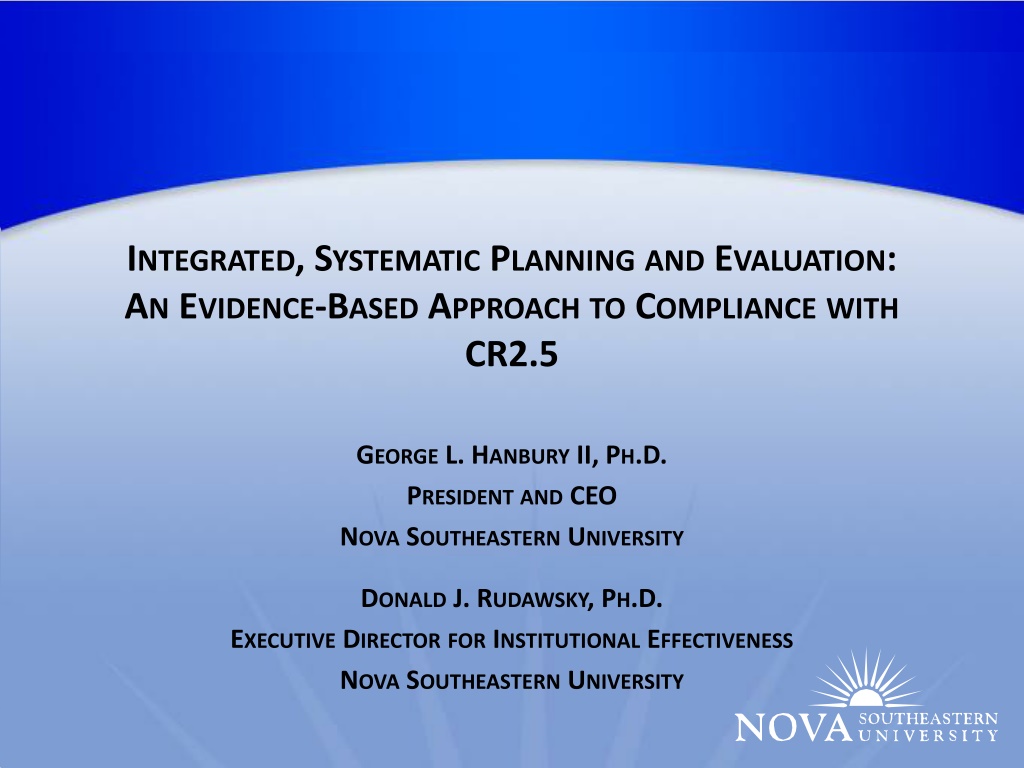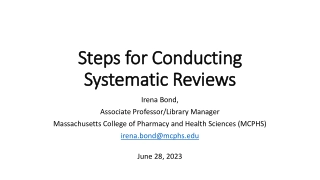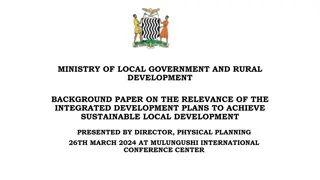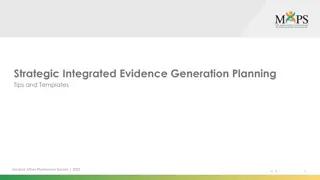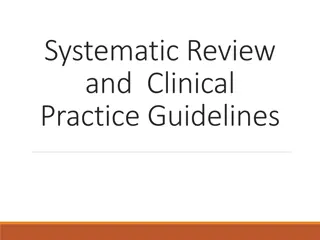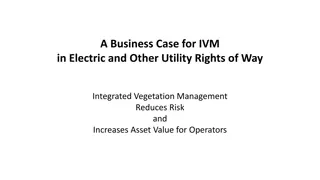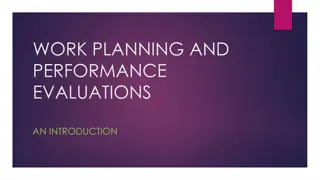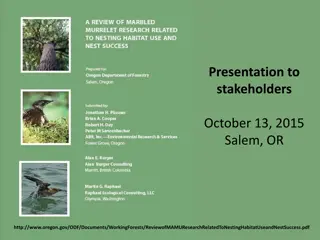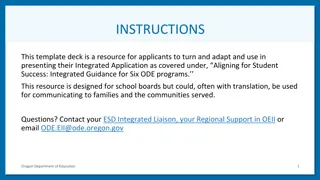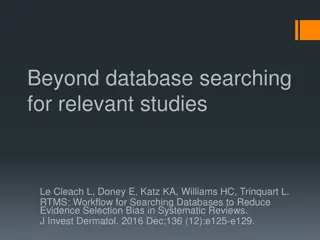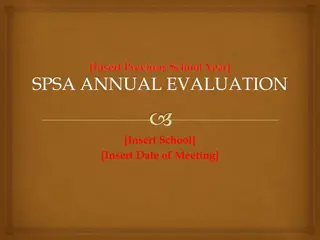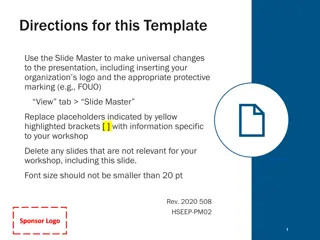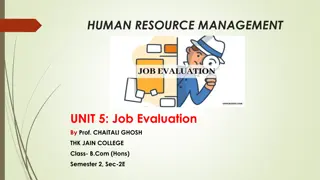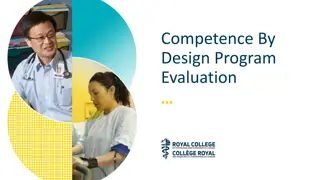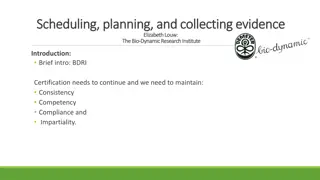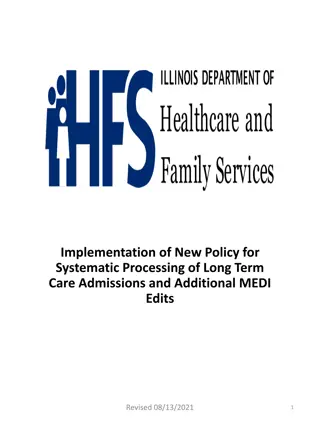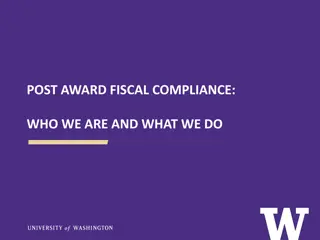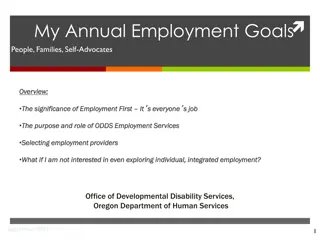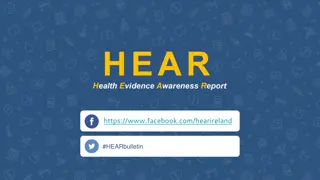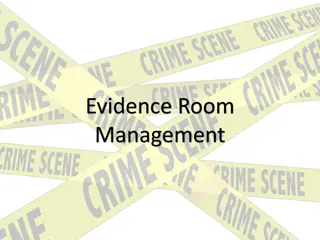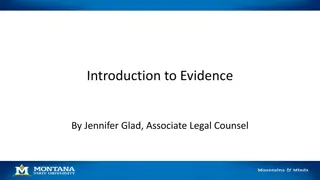Integrated Systematic Planning and Evaluation: An Evidence-Based Approach to Compliance
Compliance with CR2.5 entails demonstrating engagement in integrated, institution-wide, research-based, and systematic planning and evaluation processes for continuous improvement in institutional quality. This session explores applying these principles through a case study at Nova Southeastern University.
Download Presentation

Please find below an Image/Link to download the presentation.
The content on the website is provided AS IS for your information and personal use only. It may not be sold, licensed, or shared on other websites without obtaining consent from the author. Download presentation by click this link. If you encounter any issues during the download, it is possible that the publisher has removed the file from their server.
E N D
Presentation Transcript
INTEGRATED, SYSTEMATIC PLANNINGAND EVALUATION: AN EVIDENCE-BASED APPROACHTO COMPLIANCEWITH CR2.5 GEORGE L. HANBURY II, PH.D. PRESIDENTAND CEO NOVA SOUTHEASTERN UNIVERSITY DONALD J. RUDAWSKY, PH.D. EXECUTIVE DIRECTORFOR INSTITUTIONAL EFFECTIVENESS NOVA SOUTHEASTERN UNIVERSITY
Abstract Compliance with CR2.5 requires that an institution demonstrate engagement in planning and evaluation processes that result in continuous improvement in institutional quality. Institutions must demonstrate that these processes are integrated, institution-wide, research-based, and systematic. This session will explore what it means to have integrated, institution- wide, research-based, and systematic planning and evaluation processes by highlighting how one institution applied this principle to its pursuit of a new Vision for 2020.
Objectives of the Session Connect planning, evaluation, mission, and improvement Demonstrate planning across multiple units Demonstrate development of a cohesive set of strategic priorities with performance targets Highlight dashboards that facilitate ongoing improvement
Session Outline 1. Nova Southeastern University Overview 2. Leadership at NSU 3. Opportunities and Challenges 4. Development of Vision, Mission, Core Values, and Strategic Priorities 5. Assessment 6. Benefits of Strategic Planning and Relation to CR 2.5
Nova Southeastern University Overview 8th Largest Private, Non-Profit in the United States (Fall 2010) Almost 80% Graduate or Professional Students 6,297 Undergraduate 18,135 Graduate 3,925 Professional 28,457 Total Growth of over 30% in last 10 years 17 Academic Units
Nova Southeastern University Campus
New Leadership In 2011, Dr. Hanbury was inaugurated as President and CEO Dr. Hanbury had served as Vice President of Finance and CFO for 12 years prior
Opportunities and Challenges Communication One NSU Developing a Shared Vision, Mission, and Core Values and Uniting NSU around Achieving that Vision
NSU Employee Engagement NSU has been conducting Employee Engagement surveys regularly since 2007 Response rates over 70% One area of Opportunity is in Communication
COMMUNICATIONPRESENTSAGENERAL OPPORTUNITYAT NSU My unit (academic or administrative) collaborates well with other units at NSU. One's own unit's is perceived to perform better than others. Unfettered communication with the administration is among the most polarized items on the survey. This may represented unequal access or exposure to leadership. NSU provides an environment where faculty and staff are encouraged to share their views freely with the Coworkers are kept well informed of what is happening here at work. Information flowing from leadership is perceived favorably by some and unfavorably by others. There is always open communication throughout all levels and across all units of NSU. This item sets "a high bar for agreement". Still, one-third agreed while one-fourth disagreed. 0% 20% 40% 60% 80% 100%
A NEW LEADER A NEW SHARED VISION In 2011, Dr. Hanbury was inaugurated as NSU s sixth President and CEO During 2010 and 2011, Dr. Hanbury conducted year-long series of meetings with 4,000+ NSU stakeholders A SET OF UNIVERSITY CORE VALUES EMERGED
NSU Team 2020 From many independent silos to one integrated system From a confederacy of academic and administrative units to an E Pluribus Unum University ("Out of many, one") From independent and isolated strategic planning to collaborative and cooperative strategic planning
VISION 2020 A beacon for directing NSU s future By 2020, through excellence and innovations in teaching, research, service, and learning, Nova Southeastern University will be recognized by accrediting agencies, the academic community, and the general public as a premier, private, not-for-profit university of quality and distinction that engages all students and produces alumni who serve with integrity in their lives, fields of study, and resulting careers. A NEW MISSION EMERGED FROM THE VISION
MISSION The mission of Nova Southeastern University, a private, not-for-profit institution, is to offer a diverse array of innovative academic programs that complement on-campus educational opportunities and resources with accessible distance-learning programs to foster academic excellence, intellectual inquiry, leadership, research, and commitment to community through engagement of students and faculty members in a dynamic, lifelong learning environment. FOUNDATION FOR PLANNING
NSUS CORE VALUES The Essence of NSU Opportunity Academic Excellence Diversity Scholarship/ Student Research Centered Integrity Community Innovation THE CORE VALUES INSPIRED A NEW VISION
Ground Rules for NSU Planning A process that is broadly participatory intentional, and meaningful to all stakeholders A process that is conducted with Integrity and the best interests of NSU A process that engages participants in iterative review and assessment A process informed by the Values, Vision, and Mission;stakeholder needs/interests; changes in the higher education arena; DATA, DATA, DATA
Integration with Existing Planning and Assessment Procedures Academic Program Review Quality Improvement Plan Quality Enhancement Plan Performance Based Budgeting
WHAT WE HAVE ACCOMPLISHED Units retreated for deliberation and consensus around Core Values, Vision, Mission PLANNING COALESCED AROUND 6 STRATEGIC PRIORITIES Identified the most compelling areas on which to focus NSU s resources Preliminary unit- specific business plans Plans refined in context of Core Values
NSUS STRATEGIC PRIORITIES Enhance Student Performance/ Engagement/Retention Strategic Priority 1 Enhance Faculty Quality Strategic Priority 2 Strategic Priority 3 Enhance Academic Program Quality Increase Nontuition Funding Strategic Priority 4 Improve Incoming Undergraduate Student Quality Strategic Priority 5 Enhance Targeted Recruitment Strategic Priority 6
ACHIEVING VISION 2020 Performance Measures Strategic Initiatives Strategic Priority Baseline: 2010 Targets: 2012-2015 2015 2020
Continuous Assessment and Feedback Key Performance Indicators Developed for each Strategic Priority Goals set for 2015 and 2020 Tracked through Dashboards
Beyond Compliance: Institutional Benefits of Integrated, Systematic Processes
Benefits of Having a Strategic Plan Define Purpose Establish Goals and Objectives Time Bound
Benefits in the Creation of the Strategic Plan Gathering information and opinion from throughout the institution Develop stakeholder ownership of the plan Build consensus among staff and faculty from all units
Benefits in Implementation of the Strategic Plan Provide a starting point for measurement and evaluation Provides focus, which increases productivity Ensure effective use of resources Satisfaction and Pride
Core Requirement 2.5 The institution engages in ongoing, integrated, and institution-wide research-based planning and evaluation processes that (1) incorporate a systematic review of institutional mission, goals, and outcomes; (2) result in continuing improvement in institutional quality; and (3) demonstrate the institution is effectively accomplishing its mission. (Institutional Effectiveness)
